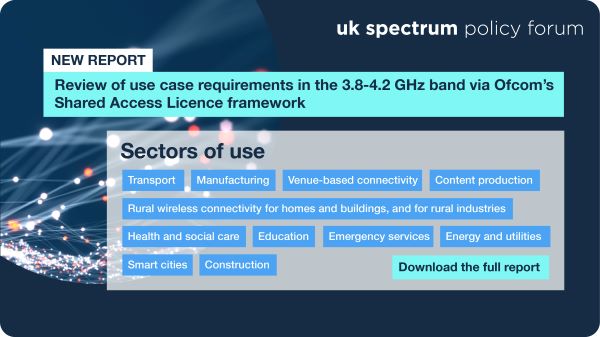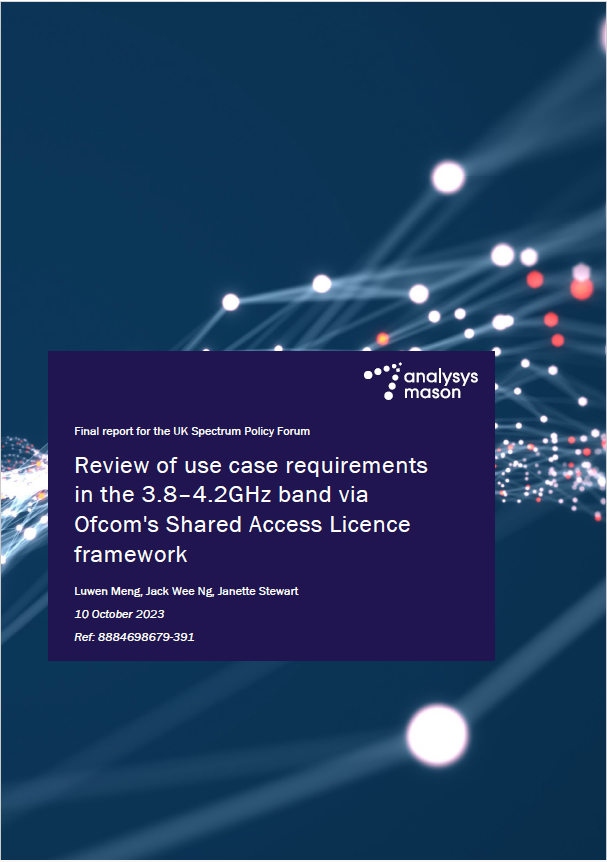UK SPF Report: Review of use case requirements in the 3.8-4.2GHz band
The UK Spectrum Policy Forum (UK SPF) launched a new report today. The industry-led sounding board to UK Government and Ofcom commissioned an independent report by Analysys Mason that provides policymakers and industry with a helpful baseline into key technology opportunities and policy challenges in the future ahead.
The study examines the current and future of the 3.8-4.2GHz band within Ofcom’s Shared Access License framework. The study aims to contribute to the overall policy discussions around the use of this frequency band in the UK and related debates in other jurisdictions, where the discussions on the future of access bands for 5G are constantly growing.
Spectrum to advance technology
The report addresses the evolution of key technologies and verticals enabled by the frequency band in analysis. Efficiency in frequency band use and a growing importance of the Shared Access Licence framework in the UK allow the deployment of new services. Half of the licenses are used for rural broadband services.
The three main use cases are wireless voice and data connectivity, research, and fixed wireless access. Other set of opportunities include:
- Asset tracking
- Neutral hosts
- Robotics
- Video streaming
- Smart city
- Content production
- Remote patient monitoring
- AR/VR
- IoT
- Cloud Infrastructure
The 3.8-4.2GHz band is above the UK national licences for 5G, but it is a part of 3GPP specifications for the use of that broadband generation. Additionally, Ofcom’s authorization output has grown with the increase in demand for this band above all others available through the SAL framework. This phenomenon occurs because local deployment suits the demand of several verticals including ports, manufacturing, mining, and healthcare. It is within this type of use cases that Ofcom’s SAL framework for the use of the 3.8-4.2GHz band are made available for all who are interested in developing localised solutions.
From smart-city applications to remote monitoring, the use of the 3.8-4.2GHz band means more accessible spectrum for local projects. Tailored coverage using private 5G networks will unlock use cases capability, by delivering connectivity with low latency and at greater capacity for large devices.
5G networks and licence models
Evolving 5G networks will improve connectivity for end users and industrial automation. In another study by Analysys Mason, the National Infrastructure Commission proposed an evaluation of 5G wireless infrastructure deployment scenarios. Examining the additional cost of 5G infrastructure roll out, the potential evolution for wireless connectivity can enhance applications running on more reliable and low-latency connections, such as IoT. Within that context, low- and medium-power SALs for private 5G networks are spreading across the UK, serving a range of activities outside dense urban areas.
After pioneering work from Ofcom, spectrum sharing in the 3.8-4.2 GHz band is gaining significant popularity across Europe. A review of potential use cases and further recommendations to improve the usability of the SAL provided in this report will no doubt help accelerate the use of this band further. UK SPF congratulates the Analysis Mason for successfully delivering this important report.
The UK Spectrum Policy Forum's latest study on the 3.8-4.2 GHz band underscores the pivotal role of spectrum sharing in shaping the future of communications. Our report sheds light on the intricate spectrum policy landscape, emphasising the growing demand for 5G and other transformative technologies, and paves the way for a more connected and innovative future.
Medium-power licences are dedicated to rural areas. It creates other restrictions to licensees, but on the other hand it allows the deployment of base stations with a longer transmission range. Whereas low-power licences give licensees flexibility to change the location and amount of base stations, yet as the name suggests they can only service a small area. Although it is possible to apply for multiple licences to act on a larger area, there are costs attached to deplyment of base stations.
This strategy by the regulator aims at impacting a broad set of industries that could adopt and benefit from 5G technology. 5G supports different services by providing lower-latency and higher-bandwidth than previous broadband generations. For instance, automated vehicles require reliable real-time data transfers to deliver the value of the application.

The use of the 3.8-4.2GHz band and expansion of private 5G networks will bring development across the board to the UK industry. This report sheds light on the possible future of technological development and deployment challenges that deserve note on further discussions around the use of the band.
Spectrum policy has a large impact in the future of connectivity and automation. The benefits from increasing the efficient use of specific bands provide insights on the overarching impacts to end users to industrial applications. The present work commissioned by the UK SPF reflects another step in its commitment to showcase a prospective view to government and regulators on the capabilities for the use of spectrum in the UK market.
If you have any questions, please contact the team below.

Sophie Greaves
Sophie Greaves is Associate Director for Digital Infrastructure at techUK, overseeing the Telecoms Programme, the Data Centres Programme, and the UK Spectrum Policy Forum.

Tales Gaspar
Tales has a background in law and economics, with previous experience in the regulation of new technologies and infrastructure.









